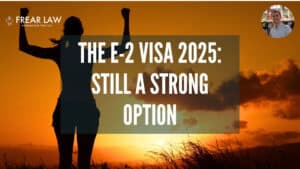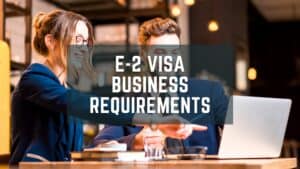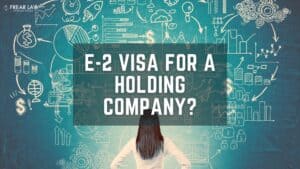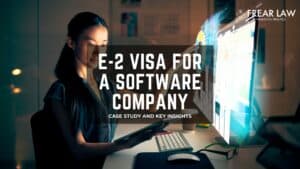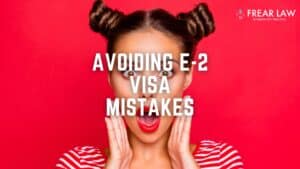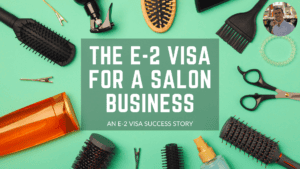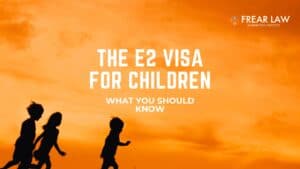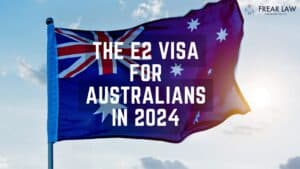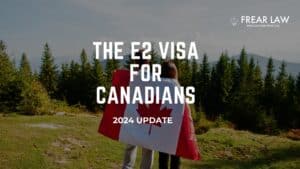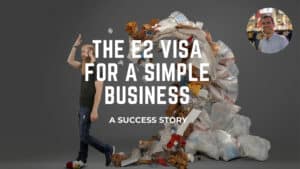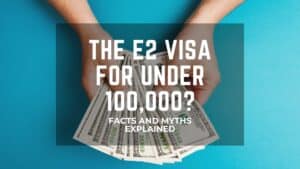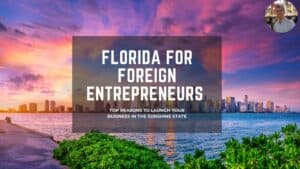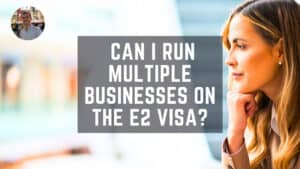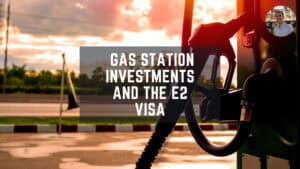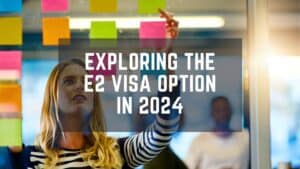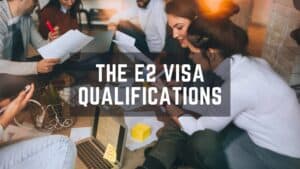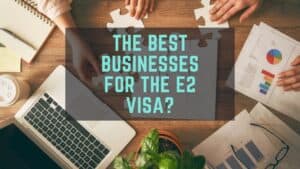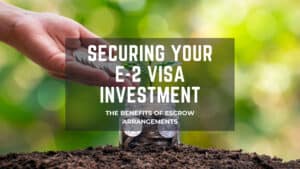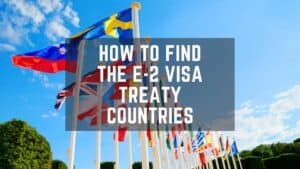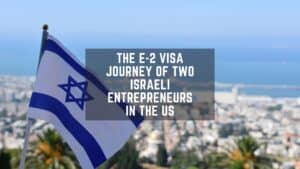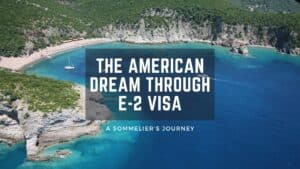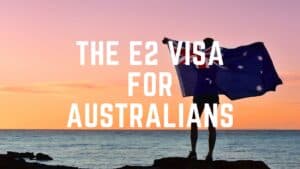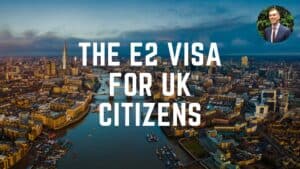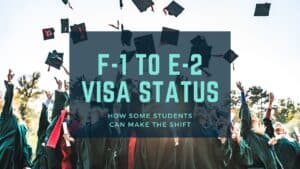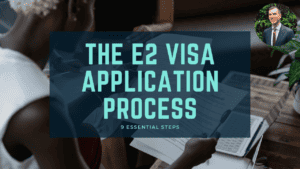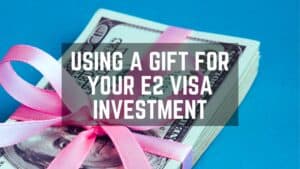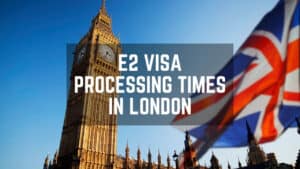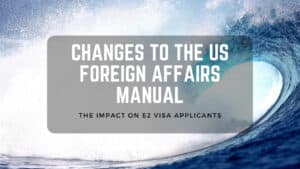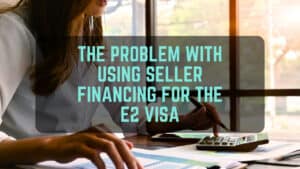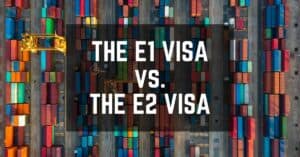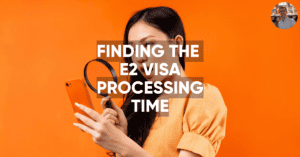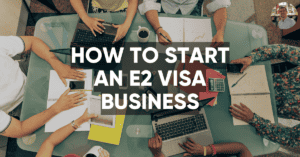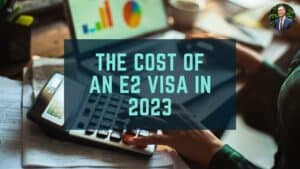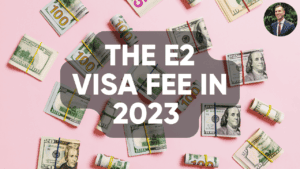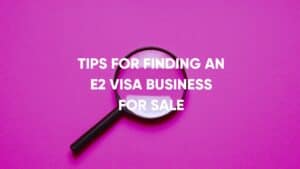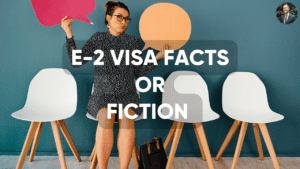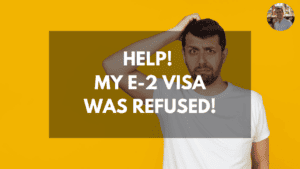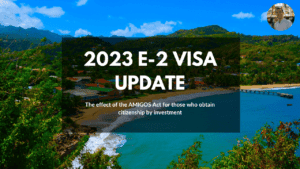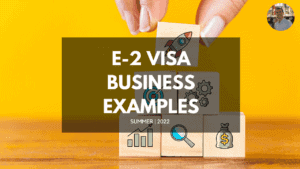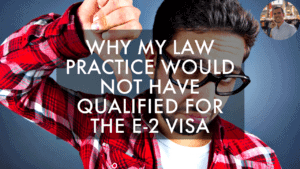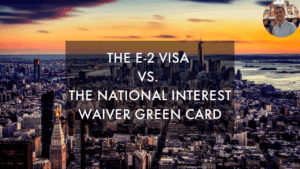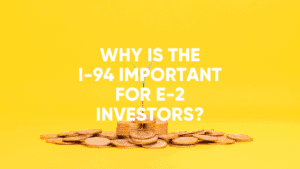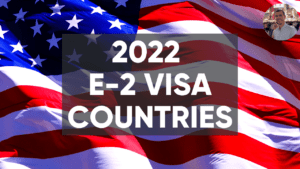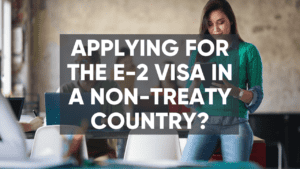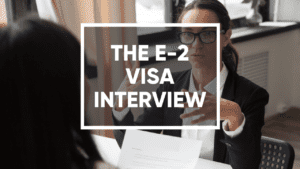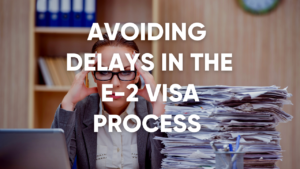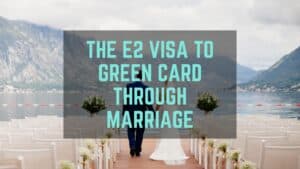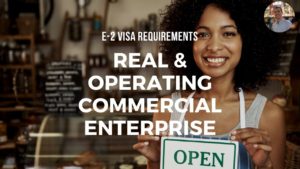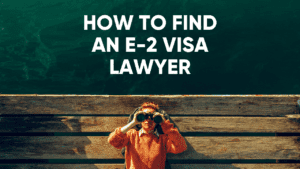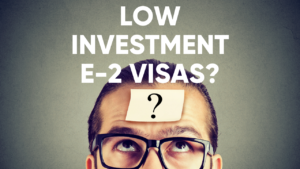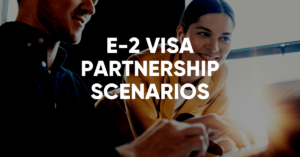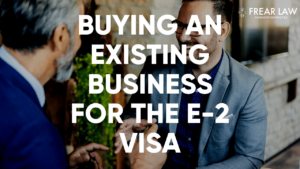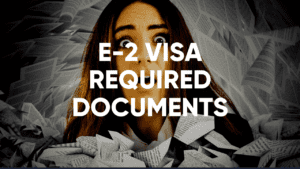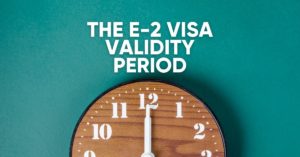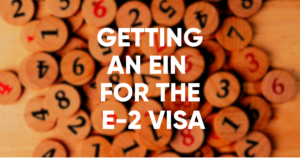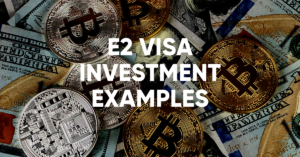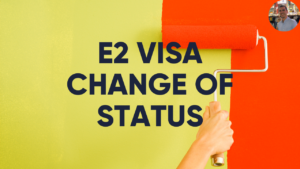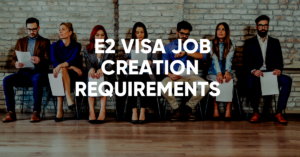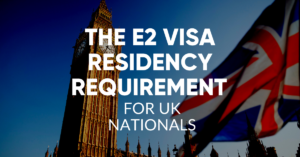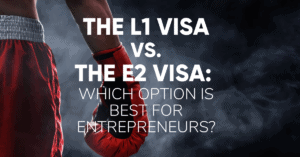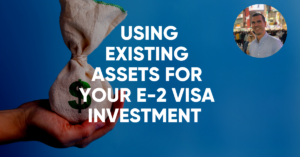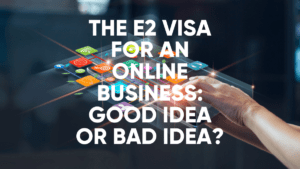The Complete Guide to the
E2 Visa in the USA
E2 Visa Introduction
Unfortunately, there are no perfect immigration options for talented entrepreneurs who come to the US to start innovative companies and create jobs. Although a perfect option does not exist, fortunately, we do have the E2 Visa. This visa enables entrepreneurs from certain countries to invest in a US business—and then come to the US to run it. This guide provides an overview of the E2 visa benefits, requirements and application process.

Main Benefits of the E2 Visa
There are a number of benefits that are associated with the E2 Visa. Here are some of my favorite E2 Visa perks:
- You can stay forever(theoretically)! As long as you are running a business that continues to meet the E2 Visa requirements, you can renew your visa an unlimited number of times.
- Your spouse can work! This is huge since so many talented entrepreneurs have equally talented spouses who want to put their skills to use in the US workforce.
- There is no minimum investment requirement! As long as your business has sufficient funding to make it a success and contribute to the US economy, you can oftentimes obtain an E2 Visa after making a modest investment.

Drawbacks of the E2 Visa
Although the E2 Visa is a great option for many, it is not perfect. Some of the drawbacks include:
- You must be a national of an E2 Visa Treaty country in order to obtain an E2 Visa.
- Your children can accompany you to the USA on the E2 Visa. However, they can not remain in the USA as an E2 dependent after they turn 21.
- There is no direct path to a US Green Card.
E2 Visa Requirements
If you decide that the possible benefits of the E2 Visa outweigh the drawbacks, the next step is to look at the requirements. The following section discusses the E2 Visa requirements in detail.

The E2 Visa Treaty
In order to qualify for an E2 Investor Visa, your country of nationality must have an E2 Visa treaty with the USA.
Fortunately, many major countries have such a treaty. The countries that have the E2 Visa Treaty include Canada, the United Kingdom, Japan, Spain, France, Australia, Mexico, Israel, Ireland, Germany, South Korea, New Zealand, Italy, Pakistan, Turkey, Egypt, Philippines, Argentina and many more.
Sadly, there are some powerhouse countries that do not have an E2 Visa Treaty with the USA. These countries include China, India, Russia and Brazil.
You can see the full list by visiting the state department’s website.
Demonstrating Nationality
Demonstrating that you are a national of an E2 Treaty country is fairly straightforward. You will usually submit a copy of your passport or other identification documents to show that you meet this requirement.
Options for Citizens of Non-Treaty Countries
If your country of origin is not included on the list, don’t sweat it. There may be other options for you to consider.
For example, you may be a seasoned entrepreneur who wants to start a business that will significantly benefit the US. If this is the case, then you may qualify for an Eb2 Green Card(National Interest Waiver).
If you want to make a passive investment in a business enterprise, then the Eb5 Green Card could be an option. By investing in a project through a regional center you could earn a return on your investment and also get a green card. One drawback to the Eb5 program is that there is a high barrier to entry. In order to qualify you would have to invest $800,000 or $1,050,000 depending where the project is located.

Making a Substantial Investment
The most frequently asked E2 Visa question is “how much do I have to invest?” This is understandable. It would certainly be my first question. The answer to this common question depends on the business that you are starting.
After filing the E2 Visa application, the adjudicator will apply a proportionality test to your investment. Using this test, they will determine if you have invested enough money to make your particular business a success.
For example, a service business such as a law firm, a consulting company or a mobile car detailing business will require a smaller investment than a manufacturing plant or a high end restaurant.
While there is no minimum investment amount, the adjudicator will look at the amount that is needed for the business. Next, they will compare that number to investment you have made. To determine if your investment is large enough, they use a sort of inverse sliding scale. The lower the cost of the business, the higher, proportionately the investment must be in order to be considered substantial.
Demonstration of the Proportionality Test
To demonstrate the proportionality test, let’s say that your service business requires an investment of $75,000 to make it successful. You invest that amount. The investment meets the proportionality test and should considered substantial.
What if a business requires a larger investment? Let’s say that you are starting an upscale restaurant in a major metropolitan area. In order to get the business off of the ground you will need a large investment. You will have to secure a location, build out a kitchen, hire a designer, furnish your space, top notch chefs etc. The startup costs could easily be $500,000 or more. Let’s say that you invest $400,000 and have plans to invest the remaining portion later. Your committed investment of $400,000 will probably be considered substantial.

The "At Risk" Requirement
In addition to investing a sum of money that will make your business success likely, you will also have to commit your money to the business.
This means that you cannot simply form a US business, transfer money to a US bank account and apply for the E2 Visa.
Instead, you will have to demonstrate that you have spent all of the money that you need to launch a successful business.
For example, if you are starting a home healthcare franchise, you may have to show that you have…
- paid the franchise fee
- committed money to rent
- paid all the professionals(ie. accountants, business plan writers, marketing consultants, lawyers, etc.)
- purchased for all of the necessary equipment(ie. computers, software, vehicles, etc.)
Using Escrow to Protect Your Investment
Going all in on a business is scary when you don’t know if you will ultimately get the visa that you need to run it. Therefore, I completely understand why my investor clients want to mitigate their risk. Fortunately, there is one popular method for protecting your money in the event of a visa denial.
You can protect yourself by placing part of your investment in escrow. This escrow agreement will contain the sole condition that the money will be released only if the E2 Visa is granted.
Escrow agreements cannot likely be used for every part of your investment. However, they can protect a large portion of it.
For example, if you are buying an existing business, you could place the purchase amount into escrow. This amount would likely represent the vast majority of you investment. If your E2 Visa application fails, you will get your money back. If your E2 Visa application succeeds, the money will be released to the seller.
The Marginal Business Prohibition
Before you decide on a business in which to invest, you should understand the marginality rule for the E2 Visa in the USA. This rule requires you to design your business so that it will provide support other US workers. A business that can only provide support for you and your family will be considered marginal and will not qualify for the E2 Visa.
If you are starting a new business, you can show that your business is not marginal even if it lacks the current capacity to employ others. This can be accomplished with the help of a well crafted business plan.

Source/Control of Investment Funds
The US government wants to ensure that your startup money did not come from illegal activities. Therefore, during the application process you will have to demonstrate the source of your money.
Additionally, you will have to show that you have control over the funds that are being used for the business. One issue that occasionally arises relates to money that is held in a jointly owned bank account. If you are using jointly held funds, then you will want to demonstrate that the other person is gifting or loaning whatever interest that they have in the funds to you.
Loans for E2 Visa Purposes
Oftentimes, an E2 Visa investment will be derived from money that is earned over a period of time. Other times, it will come from the sale of a business or property. Sometimes, loans are used for part of the investment. These loans can be secured by the personal assets of the investor. They can also be unsecured. However, they cannot be secured by the assets of the E2 business.
Establishing a Bona Fide Business
During your application process the adjudicator will examine your business to determine if it is a bona fide operation. The US foreign affairs manual defines a bona fide business as one that is “a real and active commercial or entrepreneurial undertaking, producing some service or commodity.”
Speculative businesses are not permitted. Instead, you must have everything setup. Business licenses must be secured; permits must be obtained; equipment must be purchased etc.

Directing and Developing the E2 Enterprise
As an E2 Visa Investor, you are required to show that you will be actively directing and developing the business in the USA. For example, you could be involved in overseeing operations. Or, you could carry out the day to day activities of the business. However, you cannot be a passive investor who plays no active role in the business operations.
One question that E2 Lawyers oftentimes hear relates to the issue of real estate investment. People oftentimes want to know if they can obtain an E2 Visa based on the purchase of one or two rental properties. This sort of business will probably not work for E2 Visa purposes because the investment and the investor’s role will be seen as passive.
However, one option for a real estate investor may be to set up a real estate management company. If your documentation shows that you are involved or will be involved in directing and developing such a business, your role in the company will be considered active.
Directing and Developing a Jointly Owned Business
E2 Visa lawyers are commonly asked about jointly owned businesses. Such businesses can qualify for the E2 Visa. However, the applicant for the E2 Visa must own at least 50% of the business. Additionally, the applicant will need to be able to show that they will have the ability to control the enterprise despite the shared ownership.
Immigrant Intent
The E2 Visa is a bit of an oddball because while it is not a dual intent visa(dual intent=intent to return to your home country and the intent to stay in the USA permanently) you can live indefinitely in the USA on the E2 Visa. This is possible as long as you continue to meet all of the the requirements.
Despite this reality, you will have to demonstrate that you plan on departing the USA at the end of your E2 Visa status. This can usually be accomplished by presenting a simple statement that expresses your intention to return to your home country upon the expiration of your authorized period of stay.

Demonstrating the Investment and the Creation of the Business
Demonstrating that you and your business qualify for the E2 Visa involves gathering and submitting a number of supporting documents. Below, you will find a list of commonly used documents that are used to meet the various requirements.
Source of E2 Visa Funds
- Documentation that shows the origin of the funds(ie. sale of property, sale of a business, loans, earnings, inheritance etc.)
- Bank statements/wire transfer documents showing that the money was moved into the US company’s bank account
- Documentation showing that the funds were used for qualifying business expenses for the E2 business. Such documentation could include invoices, cancelled checks and banks statements showing the transfer of the funds.
E2 Visa Business Establishment Documents
- Articles of Incorporation
- Partnership Agreements
- Business registration documents
- Documentation showing shares, titles, contracts, receipts and licenses
- Purchase Agreements for necessary business expenses
- Advertising invoices
- Escrow agreement detailing how the funds will be released
- Franchise agreements
- Signed lease for the business premises
- Evidence showing that you have acquired all of the necessary equipment, software and supplies that your business requires
- Evidence of paid invoices for necessary services(ie. accounting, legal, marketing)
- Copies of any signed contracts
- Employment records for any staff that you have hired
- Copies of promotional materials for the business(brochures, pages from the company website, etc.)
- Copies of agreements with customers/clients
The E2 Visa Business Plan
I simply cannot stress how important your business plan will be to the success of your E2 Visa application. A good business plan will provide the following details…
- An analysis of your industry and local market
- Organizational and staffing charts
- An overview of the funding and startup costs
- Revenue and personnel projections for the next five years

The E2 Visa for Employees
While the E2 Visa is commonly used by individual entrepreneurs, it is also used by organizations who want to send their high level employees to the US. In order to qualify, an E2 Visa employee’s duties must be executive/supervisory or involve essential work.
Qualifying as an Executive/Supervisor
In order to qualify as an E2 executive or supervisor, the employee must have ultimate control and responsibility over the business or a major component of it. The factors that will be evaluated to determine if the employee qualifies include:
- The employee’s authority to determine the policy and direction of the organization
- Whether the employee oversees a significant portion of the business
- The employee’s history of senior level employment
- The salary for the position
- The employee’s place within the organizational hierarchy
Qualifying as an Essential Employee
- The uniqueness of the employee’s skill set
- The employee’s proven expertise
- The function if the job
- The availability of US workers

The E2 Visa Application Procedure
E2 investor applicants usually have two application options. One option(available to people in the US) involves applying for E2 status through USCIS. The other option entails filing for the visa directly with a US consulate.
Filing for the E2 Visa
You would think that all US consular posts would have uniform instructions for filing an E2 Visa application. Sadly, that is not the case. The instructions vary significantly. Some posts require applicants to mail the application and the supporting documentation. Others require submission via email. Some have page limits. Others do not. Because of the varied requirements, it is helpful to visit the consulate’s website and read their extremely detailed instructions before you begin the E2 process.
Despite the variety, all US consular posts will require you to submit form DS-160 for each applicant. Additionally, most consulates will require form DS-156E.
After the consulate receives your application and supporting documents you will be able to schedule an interview(either immediately or after the post reviews the application package). If the interview goes well, you will be granted the E2 Visa.
Filing for E2 Status
If you are in the United States in valid status, you can apply for E2 status through USCIS. This process involves submitting:
- Form I-129 with Supplement E
- Form I-907(if premium processing is requested)
- Identity information(copy of passport)
- Evidence of lawful status(I-94)
Applying for the E2 Visa vs. Applying for E2 Status
It is generally better to apply for the E2 visa through a US Consulate. There are a number of reasons for this. The two main reasons are…
- If you apply for E2 status through USCIS, you will have to make another full application for the E2 Visa through a consulate when you leave the US.
- You will generally get a faster decision through the consulate(unless you shell out an extra $2500 to get a decision within two weeks).
E2 Visa Validity and Renewals
E2 Visa Validity
E2 Visa Extensions and Renewals
E2 Visa Posts & Videos
The E2 Visa is a nonimmigrant work visa that can be used by entrepreneurs who want to run a business in the USA. It can also be used by some employees of organizations that have made an investment in the USA.
In order to qualify for the E2 Visa as an individual investor, you must be a national of a country that has an E2 Visa treaty with the USA. Also, you must make a substantial investment in a commercial enterprise in the USA.
There are a number of countries that have an E2 Visa treaty with the USA.
The countries that have the E2 Visa Treaty in place include Canada, the United Kingdom, Japan, Spain, France, Australia, Mexico, Israel, Ireland, Germany, South Korea, New Zealand, Italy, Pakistan, Turkey, Egypt, Philippines, Argentina and many more.
Some major countries that do not have an E2 visa treaty with the USA include China, India, Russia and Brazil.
The investor must make a substantial “at risk” investment in a for profit business in the US. The E2 investor must be a national of a country that has an E2 Visa treaty with the US. The business cannot be marginal. The investor must be coming to the US to direct and develop the business.
There is no direct route from the E2 Visa to Green Card status. However there are possible routes to a US green card. The possibilities include transitioning to an Eb5 green card or applying for an Eb2 National Interest Waiver.
The E2 Visa validity period varies depending on your country of origin. Each time that you are admitted into the US on the E2 Visa, you will be authorized to stay for two years. You can extend or renew your E2 Visa indefinitely as long as you continue to meet the requirements.
Yes! A spouse of an E2 Visa holder can work in the US. This is a major benefit of the E2 Visa.
Not in the USA. In order to work for another company, the new company would have to obtain a work visa for you.
Technically, the E2 Visa is not dual intent. However, you may have the intent to run your business and remain in the USA for as long as you are authorized to do so. If you continue to meet the E2 Visa requirements, you can plan to live in the USA indefinitely.
There is no minimum investment amount. However, you need to invest an amount that is sufficient to create a successful business that will employ others.
The answer to this question will depend on the appointment availability for the consulate through which you are applying. It is not unusual to have an interview within 30-60 days after filing.
A US Green Card has a number of advantages over the E2 Visa. However, obtaining an employment based US green card is usually much more difficult than obtaining an E2 Visa.
The E2 Visa is generally easier to obtain than an L1 Visa. Also, the E2 Visa allows you to renew/extend an unlimited number of times.
However, the L1 Visa has some advantages. For example, L1 Visa holders(managers and executives) have a direct route to a green card. These executives and managers oftentimes qualify under the Eb1c green card category.
Yes, as long as the company has the nationality of a treaty company. Also, the employee must share the nationality of the treaty company. Finally, the employee must be coming to the US to work as an executive/supervisor or essential employee.
Yes! The E2 Visa plan is incredibly helpful. A good business plan will help the adjudicator see how you meet the E2 Visa requirements.
This is possible but is rarely a good idea. Business plan professionals create highly detailed and persuasive business plans that are tailored for immigration purposes. They are typically well worth the investment.

